The 6 Main Muscle Groups
Major Muscle Group #1: Chest
Major Muscle Group #2: Back
Major Muscle Group #3: Arms
Major Muscle Group #4: Shoulders
Major Muscle Group #5: Legs
Major Muscle Group #6: The Calves
A "muscle group" is exactly what it sounds like—a group of muscles close to your body that execute similar movements.
When you are training, the six main muscle groups you should pay attention to are:
1.? Chest
2.? Back
3.? Arms
4.? Shoulders
5.? Legs
6.? Calves
Categorizing muscles by body part helps us better organize and plan our training programs.
For example, if you want to strengthen your upper body, you should focus more on a full-body exercise program or a weight-lifting routine.
Training two or three times a week is a good option, but if you increase the frequency, you will quickly overtrain and even get injured, so regular training is a good habit.
On the other hand, many people focus too much on individual muscles like the biceps. But in fact, each exercise is done by muscle groups together, the balanced growth of muscle group strength and size should be the meaning of training.
Instead, by training the six major muscle groups mentioned above, a symmetrical, healthy, and aesthetically pleasing physique can be achieved. By training these six major muscle groups, the associated small muscle groups can be well developed. However, figuring out how to train them in your training program is not easy, you must thread a needle and thread through each muscle group to maintain balanced gains in muscle and strength to avoid muscle imbalances or injuries.
Major Muscle Group #1: Chest
The main muscle of the chest is the pectoralis major, or “pec” major. The main function is to help the upper arm across the body. Unlike most other muscles, however, the fibers of the pectoral muscles are not all aligned in the same direction.
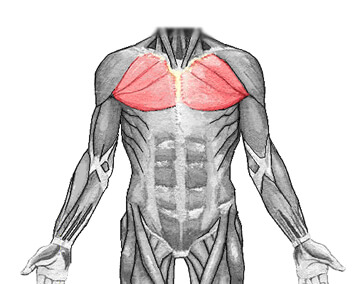
The pec major has multiple “points,” or places where the muscle fibers attach to the skeleton.
There’s a sternocostal point, which attaches the sternum and ribcage to your upper arm, and a clavicular point, which attaches your collarbone to your upper arm.
Why is this important?
Exercises that involve pushing the arms in front of the chest, like the flat and decline bench press, emphasize the larger sternocostal point of the pecs.
Exercises that involve moving the arms up and away from the chest, like the incline and reverse-grip bench press, emphasize the smaller clavicular point.
Thus, if you want to develop a full, proportionate, well-defined chest, you want to focus on chest exercises like these:?
? Flat barbell bench press
? Incline barbell bench press
? Flat dumbbell bench press
? Incline dumbbell bench press
? Close-grip bench press
? Reverse-grip bench press
? Dips
Summary: The chest muscle is composed of two sections, or “points”—the sternocostal and clavicular point, and you should use exercises that target both points to maximize muscle growth.
Muscle Group #2: Back
The four muscles that make up the bulk of the back, and that we want to focus on developing, are the:
? Trapezius
Your traps connect your spine to your shoulder blades.
? Rhomboids
The rhomboids stabilize your shoulder blades by linking them to your spine.
? Latissimus dorsi
The lats attach your upper arm to your back to form a winglike shape.
? Erector spinae
The spinal erectors run parallel to your spine and do exactly what you’d expect—keep your spine stabilized and upright.?
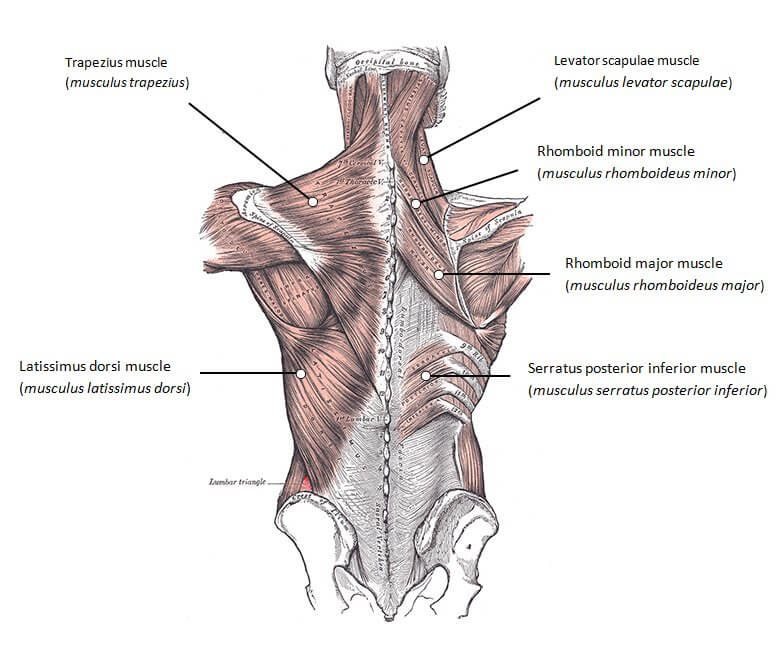
Developing a wide, thick, defined back is one of the best ways to take your physique from “decent” to “exceptional.”
If that’s your goal, then you want to focus on back exercises like these:
? ? ? ?? Barbell deadlift
? ? ? ?? Sumo deadlift
? ? ? ?? Trap-bar deadlift
? ? ? ?? Lat pulldown
? ? ? ?? Seated cable row
? ? ? ?? Pullup
? ? ? ?? Chinup
? ? ? ?? Dumbbell row
? ? ? ?? Seal row
Summary: Your back is made up of four large muscles, and the best exercises for training them all involve horizontal and vertical pulling, such as the barbell deadlift, lat pulldown, and dumbbell row.
Muscle Group #3: Arms
The arm is mainly composed of four muscles:
? Biceps brachii
? Biceps brachialis
? Triceps
? Forearms
The arm is made up of the biceps, triceps, forearm muscles, and a few other small muscles. You should include some direct work on the biceps and triceps, but you usually don't need to work the forearms directly.
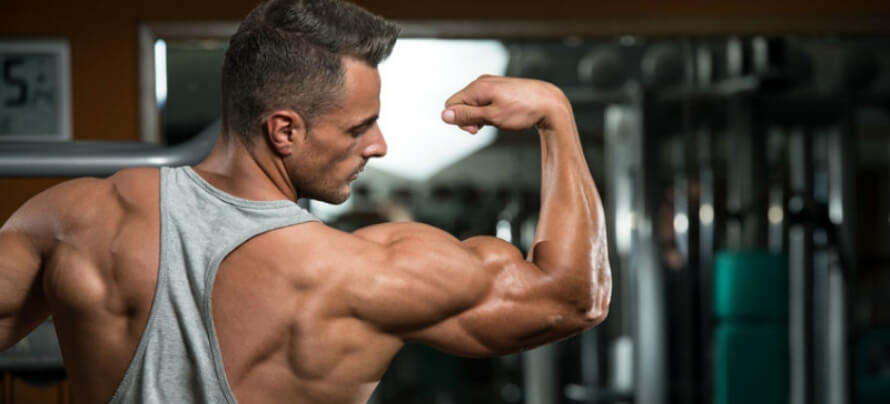
So, if you want to work and strengthen your biceps, triceps, and forearms, you need to focus on arm exercises like these:
? Barbell curl
? Dumbbell curl
? EZ-bar curl
? Skull crusher
? Triceps pressdown (with rope or metal handle)
? Dips
? Triceps overhead press (with cable or dumbbell)
? Close-grip bench press
? Chinups
? Pullups
Muscle Group #4: Shoulders
Your shoulders are comprised of three major muscles known as deltoids.?The three points of the deltoids are the:
? Anterior point (front)
? Lateral point (middle)
? Posterior point (rear)
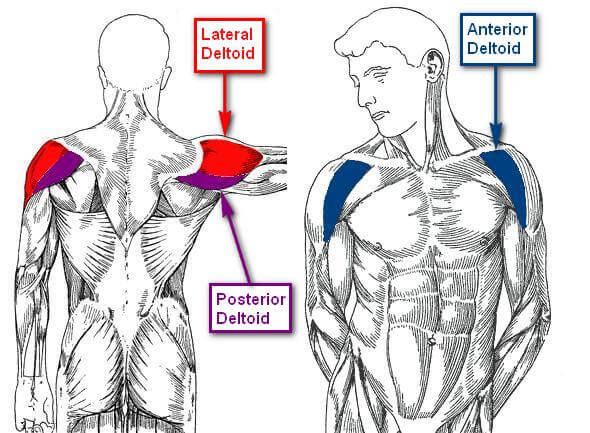
The deltoids are primarily used to stabilize muscle groups near the shoulders, such as the pecs, lats, and biceps.
The posterior deltoid helps the lats and traps bring the arms behind you, the anterior delts help the pecs bring the arms forward, and the outer delts help the traps, pecs, and other muscles around the neck and upper back Raise your arms to the side.
By changing the angle of the press or pull, you can change the degree to which the deltoid is trained relative to other muscles. For example, an overhead press will use more of the lateral deltoid bundle than the upper chest, while a barbell row will use more of the rear deltoid bundle than a lat pulldown.
It is very important to develop all three points of this muscle because if one of them falls behind, it will be very noticeable.
For the most part, the lateral and rear delts need the most work because the anterior deltoid is well trained during chest workouts, and no one skips a chest training day.
However, chest training doesn't adequately train the other two deltoid points, which is why it's best to include some extra exercises that train your outer and rear delts at the same time.
If you want to develop all three points of your deltoids, you want to focus on shoulder exercises like these:
? Dumbbell side delt raises
? Dumbbell rear delt raises
? Barbell rows
? Dumbbell rows
? Military press
? Flat bench press
? Incline bench press
Summary: The shoulders are made up of points on the front, sides and back, it is important that you include exercises that train all three points in your program for a balanced, proportionate look.
Muscle Group #5: Legs
The upper portion of the legs are made up of several major muscle groups:
? The quadriceps
? The hamstrings
??The glutes
Although the calf is also a part of the leg in terms of body structure, it is explained separately due to the different training methods. Each of these muscle groups needs to be best trained with different exercises.
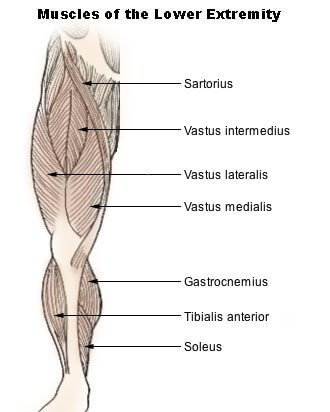
The Quads
The quadriceps are a set of four large muscles on the front of your legs:
? The vastus lateralis
? The vastus medialis
? The vastus intermedius
? The rectus femoris
The quadriceps work together to extend the knees and flex the hips.
So, quadriceps exercises bring the hips from an extended position to a flexed position (bending the joints) and bring the knees from a flexing position to an extended position (straightening the joints).
When the quadriceps are well developed, they form the core of the leg.
As you'll see, the best quad exercises you can do are mostly combo exercises and mostly involve using free weights.
If you want to maximize your quads, you need to focus on things like these:
? Barbell back squat
? Barbell front squat
? Dumbbell lunge
? Leg press
? Bulgarian split squat
The Hamstrings
The hamstrings are a group of three muscles on the back of your legs:
? Semitendinosus
??Semimembranosus
? Biceps femoris
The hamstrings work together to flex the knees like you do with hamstring curls, and to extend the hips in exercises like the hip thrust and deadlift.?The biceps femoris is also divided into two "dots" or sections, just like the biceps in your arm.?Unlike the biceps, however, the hamstrings tend to be one of the most neglected muscles in the lower body.
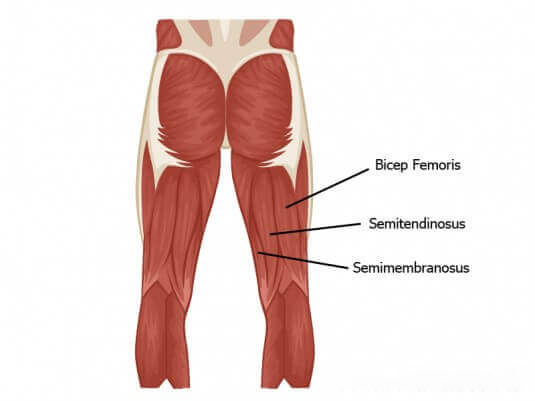
The quads get most of the attention because they are larger and more prominent, which can create a muscle imbalance between the front and back of the thigh that not only looks strange but increases the risk of injury.
A lot of people have the wrong idea that squats aren't all the hamstrings need. While squats do involve the hamstrings, the quads do most of the work. This is especially true for the type of squats you often see in the gym.
If you want to maximally develop your hamstrings, you want to focus on exercises like these:
? Barbell deadlift
? Sumo deadlift
? Romanian deadlift
? Hamstring curl machine
? Barbell good-morning
? Glute-ham raise machine
The Glutes
The gluteus muscles, or “glutes,” are comprised of three muscles that form your butt:
? The gluteus maximus
??The gluteus minimus
? The gluteus medius
The glutes play a key role in stabilizing your body in a variety of sports and in generating power in exercises like deadlifts and squats.
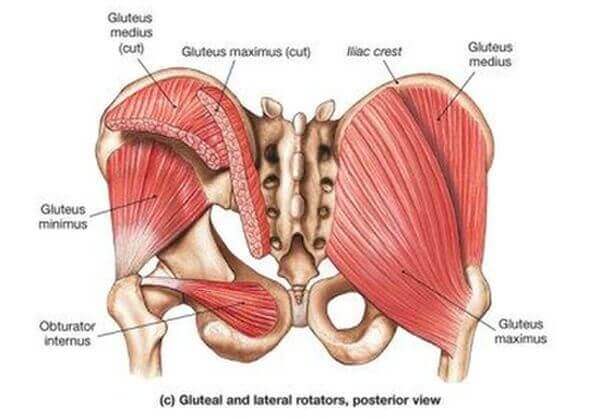
But now, if you train your lower body properly, you don't have to do extra work for your glutes because it's going to work together in the lower body workout.
If you want to maximize your glutes, you need to focus on things like:
? Barbell deadlift
? Sumo deadlift
? Romanian deadlift
? Glute lifter/Glute Isolate
? Barbell Hip Press
? Barbell squats
Summary: The upper part of the leg is made up of the quadriceps, hamstrings, and glutes, and you'll want to incorporate exercises that work these muscle groups into your routine to maximize leg strength and size.
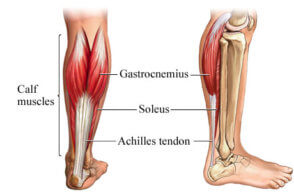
Muscle Group #6: The Calvs
The calves are made up of two powerful muscles:
? The gastrocnemius
? The soleus
The calf is made up of the gastrocnemius and soleus muscles, both of which you need to train through standing and seated calf exercises.
There aren’t that many worthwhile calf exercise variations you can do, but here are the ones if you want to focus on:
? Standing calf raise machine
? Standing barbell calf raise
? Seated calf raise machine
? Donkey calf raise machine
? Single-leg bodyweight calf raise
Post time: Nov-10-2022
